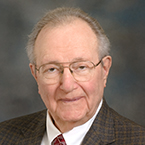
Emil J Freireich, MD, DSc, FAACR, who developed a landmark treatment for childhood acute lymphoblastic leukemia, died February 1, 2021, at the age of 93.
Freireich was born in 1927 in Chicago. He earned his bachelor’s degree and medical degree from the University of Illinois. He completed his internship and residency at Chicago hospitals, and then did a fellowship in hematology at Massachusetts Memorial Hospital in Boston. In 1953, he was drafted into the U.S. Army, but was allowed to serve by working at the National Institutes of Health. There, he conducted his earliest groundbreaking research on acute lymphoblastic leukemia (ALL).
Early in his research, Freireich helped discover how to stop bleeding in children with leukemia. Freireich established that transfusions of new, platelet-rich blood could significantly reduce the risk of hemorrhaging, which had previously caused the deaths of many young leukemia patients. This discovery dramatically reduced suffering, and it also allowed children to survive longer, allowing for more time for Freireich and his colleagues to delve deeper into a potential cure.
In the 1950s, Freireich and his team designed clinical trials to test experimental combination therapies in children with ALL. His research proved that multiple drugs given simultaneously, both during the initial course of treatment and for a year after the patient was in remission, could often cure ALL. Today, Freireich’s discoveries are still used in clinical practice, and survival rates for childhood leukemia exceed 90 percent.
In 1965, he joined The University of Texas MD Anderson Cancer Center, where he became a renowned professor as well as a groundbreaking researcher. Over the course of his career, he won almost every teaching award at the institution, as well as many national and international education awards. At MD Anderson, he directed the special medical education programs, oversaw the physician-scientist training program, chaired curriculum committees, and helped organize the core curriculum. He helped establish the Department of Developmental Therapeutics and served as director of the Adult Leukemia Research Program. He also obtained one of the first formal training program grants in medical oncology at MD Anderson. He retired in 2015, but he remained involved with the institution.
Freireich became a member of the AACR in 1962 and transferred to Emeritus membership in 1993. He was named a Fellow of the AACR Academy in 2014 and was honored with the AACR Award for Lifetime Achievement in Cancer Research in 2019. He received countless other accolades, including the Albert Lasker Clinical Medical Research Award in 1972; the David A. Karnofsky Memorial Award and Lecture from ASCO in 1976; the de Villiers International Achievement Award from the Leukemia and Lymphoma Society in 1979; the Jeffrey A. Gottlieb Memorial Award from MD Anderson Cancer Center in 1981; the Charles F. Kettering Prize from the General Motors Cancer Research Foundation in 1983; and the First NIH Distinguished Alumni Award in 1990.
In addition, he won the Medical Oncology Fellows Outstanding Teacher Award from MD Anderson Cancer Center and the Return of the Child Award from the Leukemia Society of America in 1996; the Charles A. LeMaistre Outstanding Achievement Award in 2000; the Cino del Duca Award; the 11th International Congress on Anti-Cancer Treatment from the UICC in 2001; the Pollin Prize for Pediatric Research from Columbia University in 2003; the Gerald P. Bodey Sr. Distinguished Award in 2005; and the Paul Ehrlich Magic Bullet Lifetime Achievement Award in 2008. MD Anderson created the Emil J. Freireich Award for Excellence in Education to honor his commitment to teaching.
“Dr. Freireich was an accomplished physician-scientist whose pioneering work saved the lives of entire generations of children,” said Margaret Foti, PhD, MD (hc), chief executive officer of the AACR. “His research changed the way we think about pediatric leukemia, transforming it into a disease that can be cured.”
Leave your remembrance of Dr. Freireich below.
Emil Freireich was wonderful combination of a clinical scientist, a teacher and human being. I came to know him in early 70.s when he was at the MD Anderson Cancer centre. I was cancer cell kinetics using 3H Thymidine, in leukemias and solid tumors in 60's early seventies. He encouraged me to continue the work, since he found that combination chemotherapies in ALL were based on some of the knowledge.
He has been an intellectual giant who inspired many and will be dearly missed by all of us